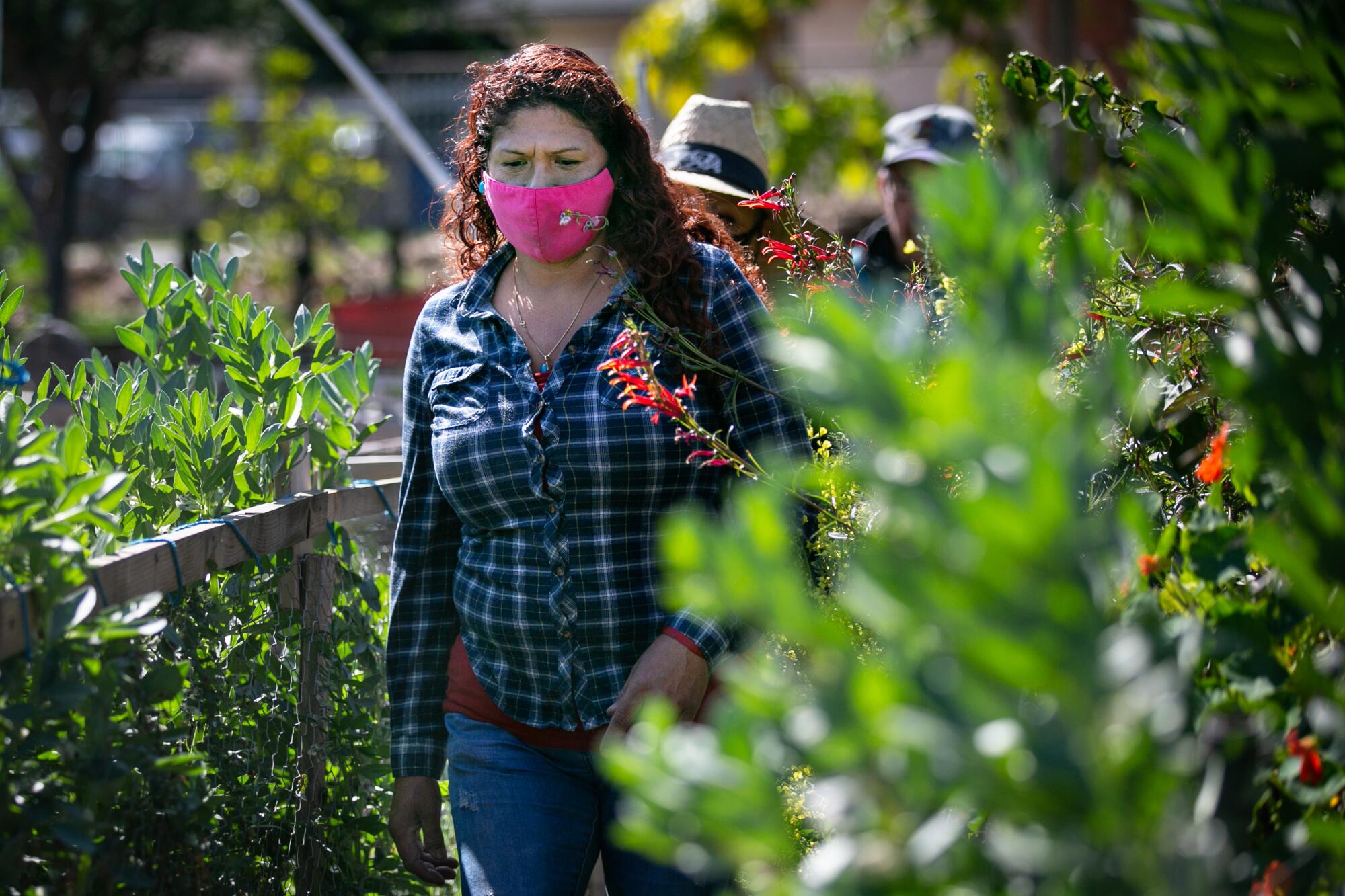
- Share via
For nearly all of its 20 years, La Madera Community Garden in El Monte functioned like the vast majority of similar spaces in Southern California.
People who wanted to grow fruits and vegetables alongside fellow green thumbs paid a nominal fee for a small plot. Their efforts beautified what would’ve otherwise been an empty lot, and provided a pantry for immigrants and working-class folks hard up for fresh food.
Organizers dreamed their experiment was the first step toward a different food system for the Southland, one in which the public bought produce from small growers instead of agricultural conglomerates. But the execution just never quite got it there.
Interest in La Madera ebbed and flowed, depending on who worked the soil. For a while, admitted longtime volunteer Leo Nava, there were so many overgrown weeds that “it looked like a jungle.”
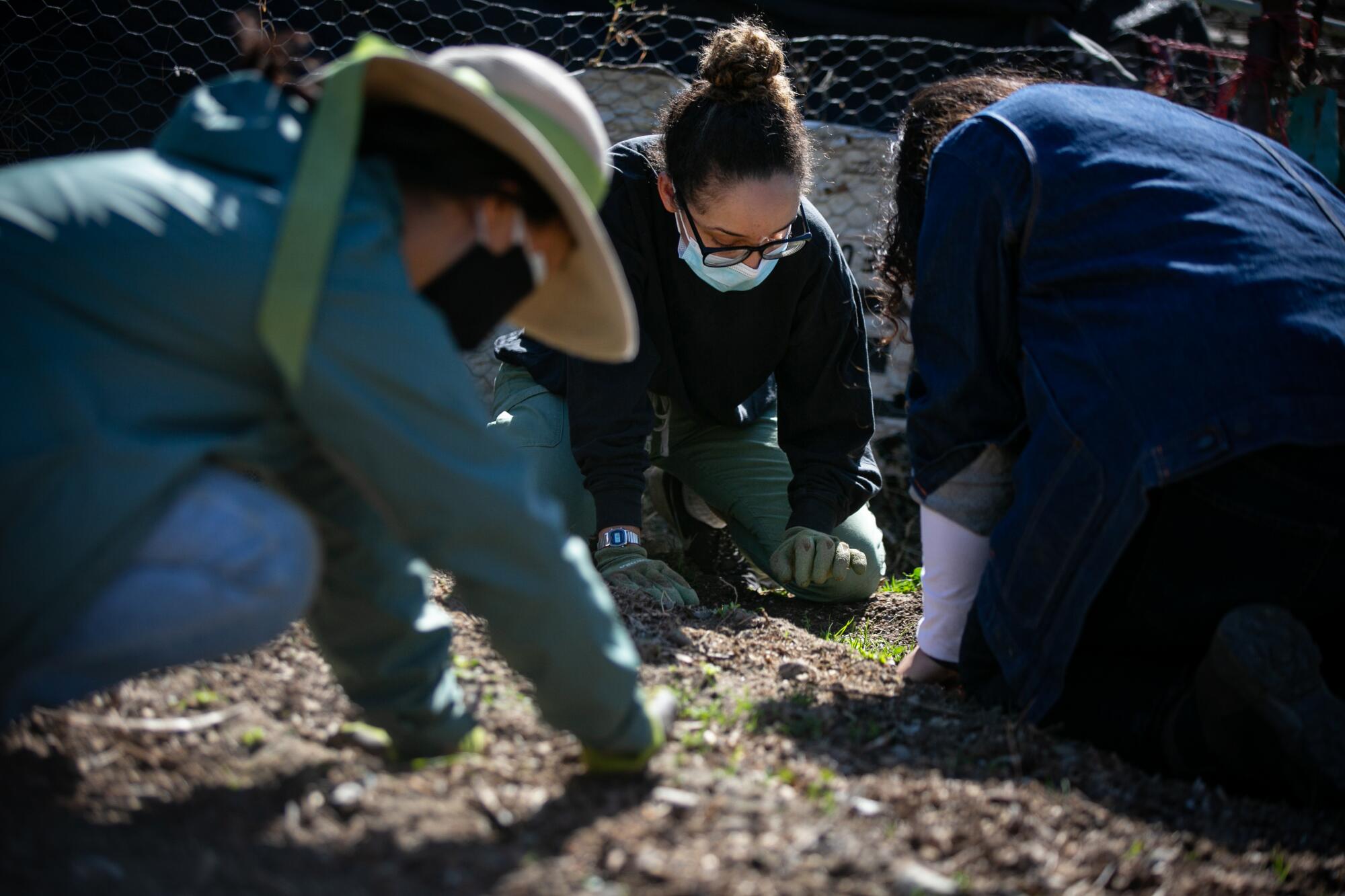
About four years ago, a new generation of leaders stepped up. Right now, La Madera’s 37 plots burst with winter’s bounty: fat fava beans, bumpy cauliflowers, huge heads of lettuce, and crimson-red beets with dark-green leaves that make the veggies look like edible traffic signals.
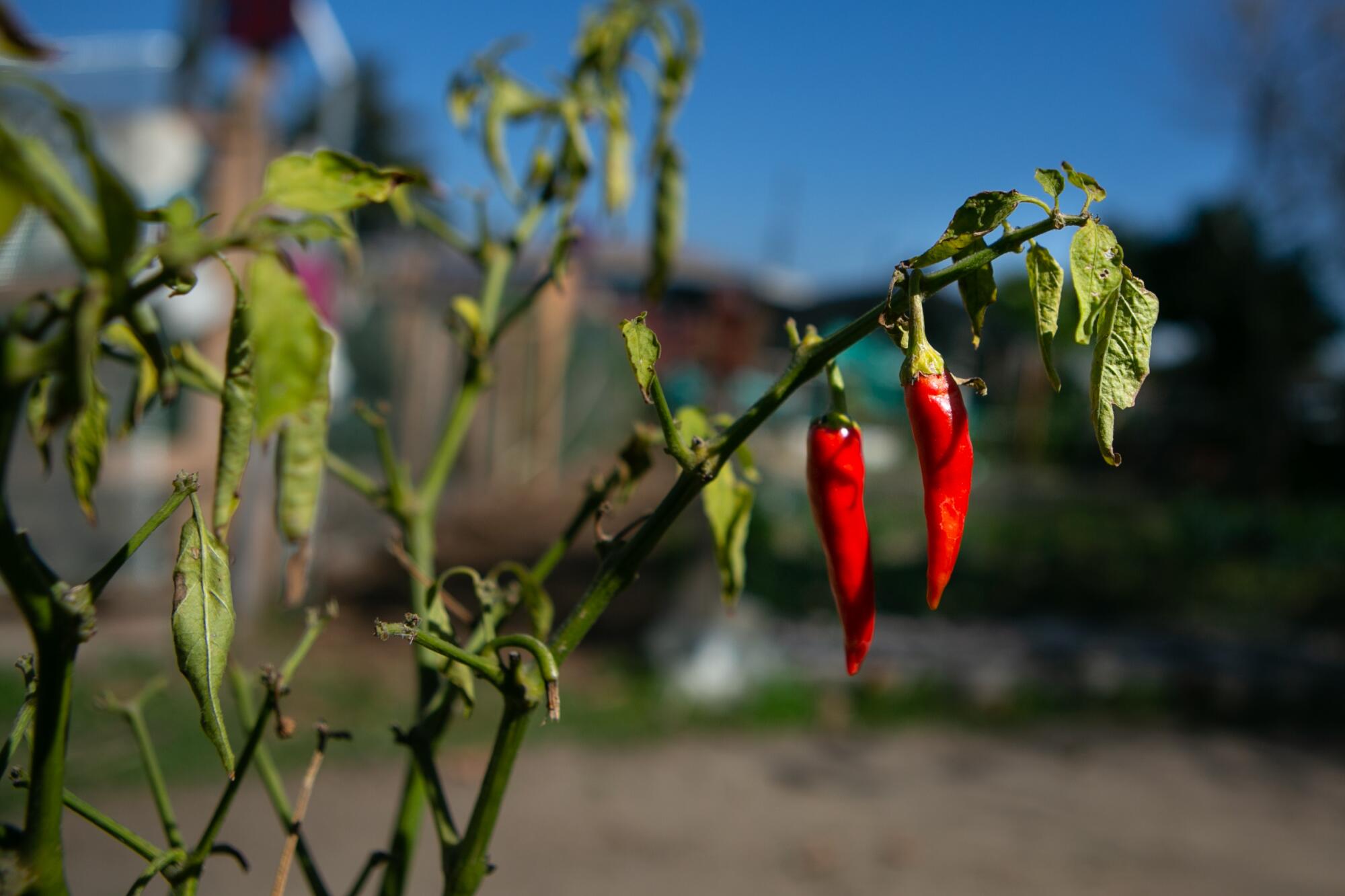
“My father told me growing crops is like love,” Lucia Nuñez said as she gave me a tour. The 49-year-old Michoacán native manages volunteer workdays. “Water them so they continue to flower. Give and accept. And always pay attention to what’s happening — because if you don’t, it can quickly go away.”
Nuñez and others are now planning for a fruitful future that never quite existed before: A farmers market. More community gardens across El Monte, one of the most park-poor cities in Los Angeles County. Even a campaign to buy the land on which La Madera sits from the kind owner who currently allows them to lease the quarter-acre for free.
What gives everyone so much hope? Nuñez saved La Madera’s expected cash crop as my tour’s grand finale, an item that she and her friends have never harvested before but think can transform their farming passion into a livelihood.
Hot sauce.
Under the shade of a sycamore tree, La Madera members showed off bottles of Los Angeles Hot Sauce, a thick habanero-mango condiment launched by Bronx-based Small Axe Peppers in 2019. In a couple of weeks, they’ll get 200 habanero seeds and hope they will sprout a summer harvest that will go into the next batch of the sauce. Small Axe has promised to buy all of La Madera’s habaneros and pay for them in cash or in bottles that La Madera can then sell and keep the profits.
Everyone is excited — and nervous.
“You can’t just put [habanero seeds] in the ground,” Nuñez explained. “The birds can eat them, or the weather can harm them if it suddenly gets too cold. So we’ll start them in a hothouse.”
“We can give everyone plants to grow on their own,” said Arturo Martinez, who visits La Madera at least once a week to “relax” and garden. “And then bring back what we grow to better all of our lives.”
“I fought so many years to grow one little habanero bush,” warned Nava, 72. “It’s difficult to grow. That’s why no one used to grow habaneros. I’d have to bring in seeds from Mexico.
“But to now have a chance to grow them for a salsa to sell? That’s just something special.”
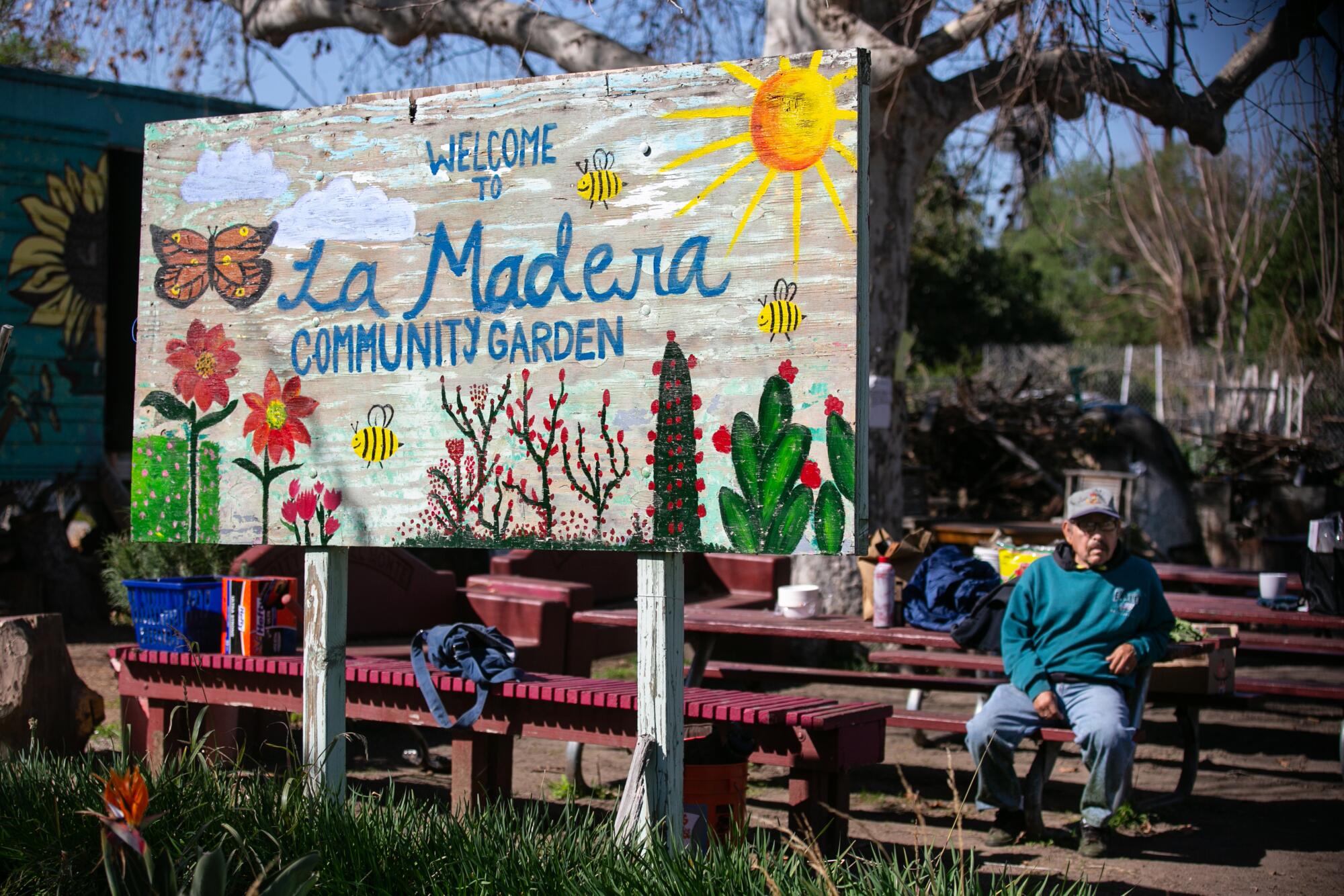
Such wary joy is familiar to chef King Phojanakong, who creates the recipes for Small Axe’s 13 hot sauces. The company works with 90 community gardens in 15 cities across the United States that grew five tons of peppers last year. Small Axe’s moniker comes from the Bob Marley song of the same name that warns the mighty of the world “if you are the big tree/We are the small axe/Ready to cut you down.”
“We need to get hyper-local,” said Phojanakong, a son of Filipino and Thai immigrants who also produces an Oakland hot sauce that uses serranos from a community garden there. “I wanted to bring in a whole different look to hot sauces — not just a look, but a flavor and system. That’s why the name. It ties all in.”
He laughed when I asked where does a New Yorker like him get off trying to make a hot sauce for us. “I get people from L.A. to my restaurant, and I had them test it until they liked it!” Phojanakong said. “For me, I was thinking palm trees and nice weather.”
Los Angeles Hot Sauce, which sells almost exclusively online right now, is popular enough that Small Axe approached the Los Angeles Community Garden Council this summer for a new partner to grow habaneros. The request came at a perfect time for La Madera, which had to stop its popular gardening workshops because of COVID-19.
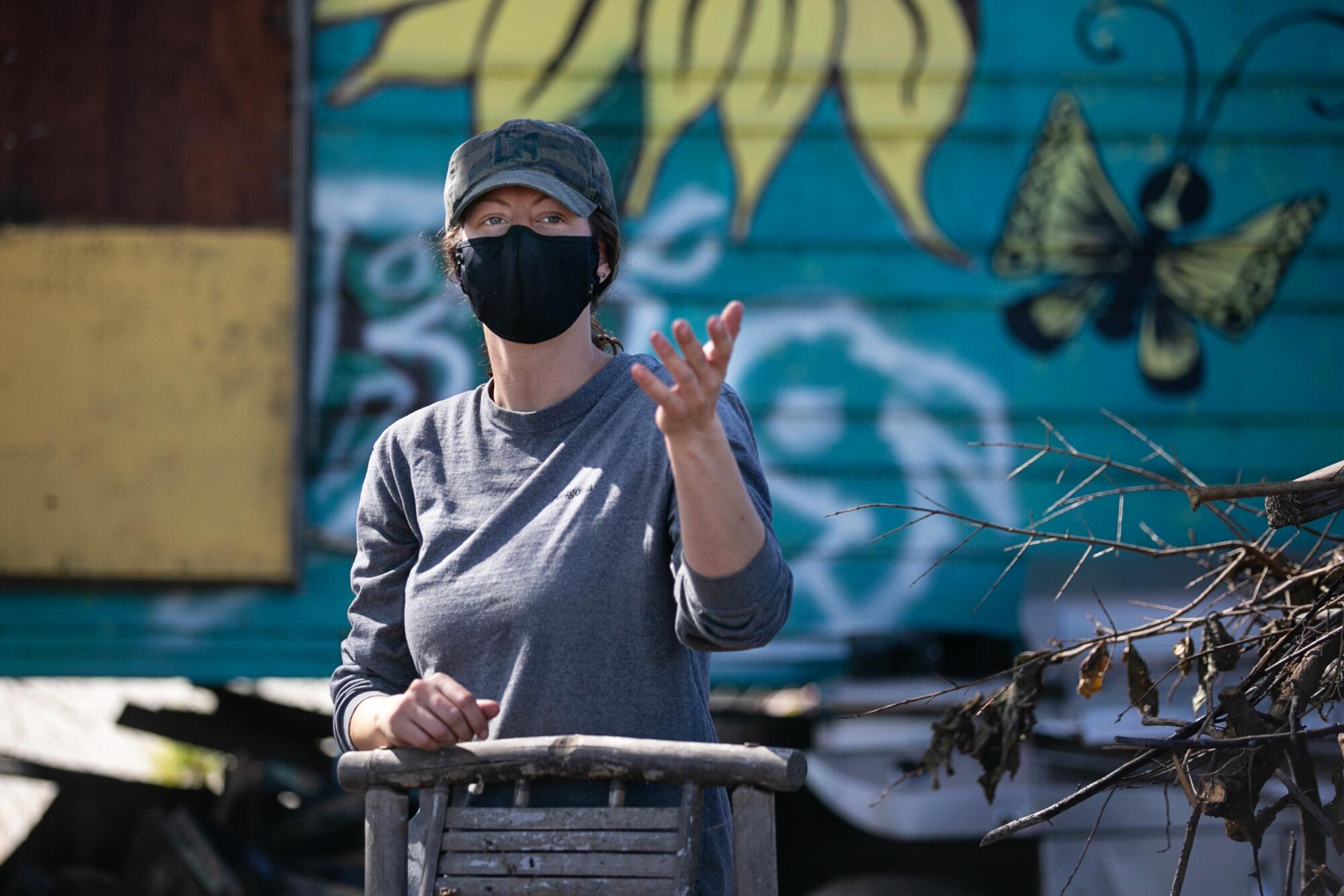
“It hits so many different levels,” said Elizabeth Christy. The Philadelphia native is the program manager for Eco Urban Gardens, a nonprofit that helps La Madera with day-to-day operations. “I love the model of sourcing locally, and creating a relationship with community members. There’s not a lot of entrepreneurial opportunities [in El Monte], so anything we can do to boost it, especially now, is great.”
“A lot of us don’t have work,” said Gloria Leyva, whose day job is making tamales for a bakery. “If we can get a little money by growing [habaneros] and selling them, and be able to pay for our rent, that’s wonderful.”
Christy isn’t sure whether La Madera members will sell the peppers back to Small Axe and keep the money, or take the hot sauce as compensation and hawk it at events and local stores. It’s a challenge, she admits, to push a newish hot sauce in the region that gave the world Tapatío, Sriracha and El Pato. “But it sounds like the most fun way, and the most lucrative.”
But enough talking about the economics and transformative potential of Los Angeles Hot Sauce. I know what ustedes gentle readers are thinking: Is it any good?
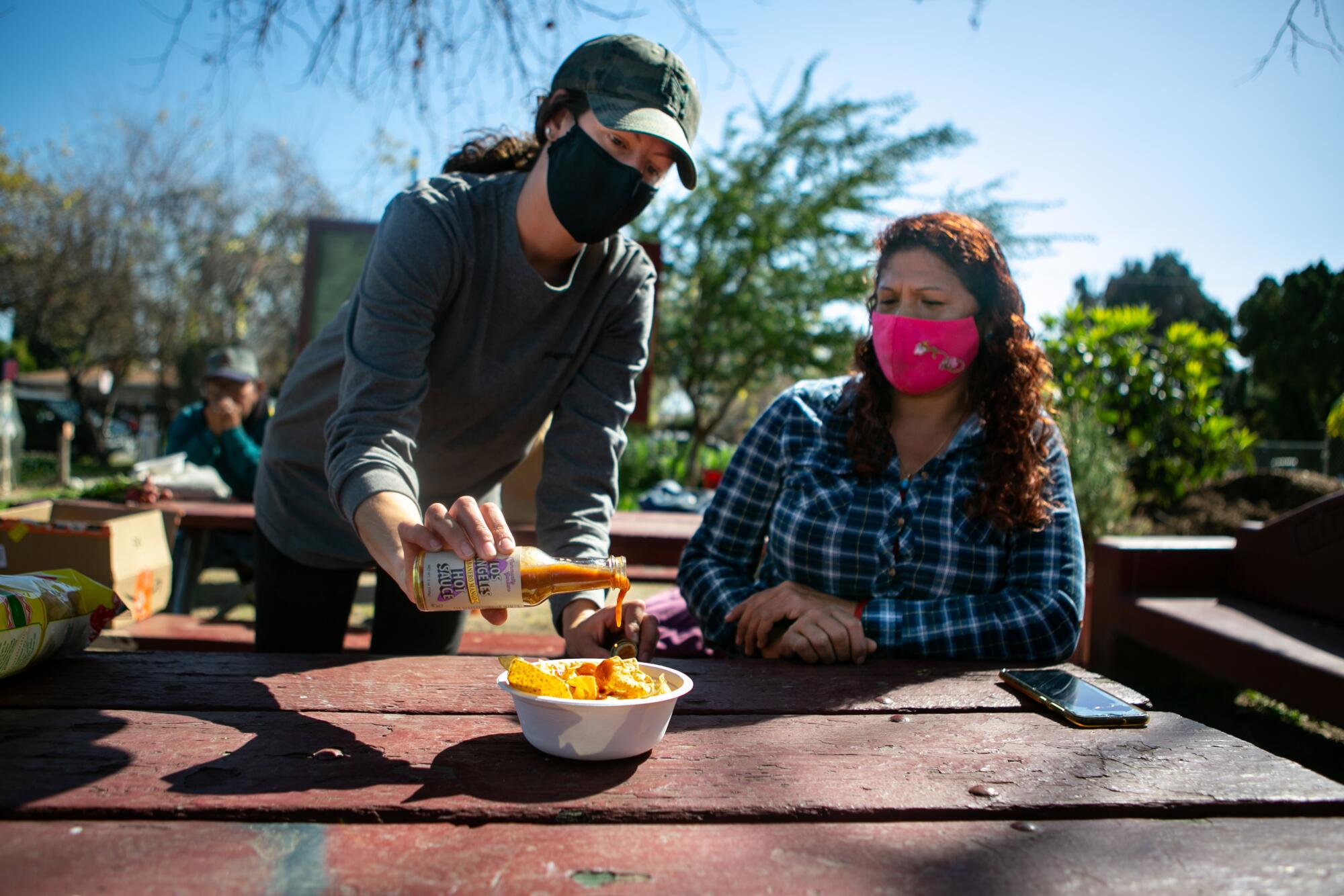
Leyva and Nuñez hadn’t tasted the hot sauce until I visited, but Christy had. “It’s got sweet right up front, then the slow burn of those L.A. summers,” the 33-year-old told us as she uncorked a bottle and poured it over bowls filled with tortilla chips.
Everyone grabbed their share.
“Picosa pero sabrosa,” said Leyva. Spicy but delicious.
“Buenísima,” added Nuñez. Very good.
“Para unos tacos de asada,” said Nava.
“Unos chilaquiles,” countered Leyva as Nava’s grandson, Marco Gonzalez, took his own bite. “It’s not that hot, but it’s good,” the 19-year-old said.
I tasted the Los Angeles Hot Sauce last. A luscious fruitiness rich with hints of tamarind and blood orange quickly segued into habanero’s citrusy scorch. I expected heat, but not this much — but I kept eating.
Then I stopped and panted, as I looked around for my water. Everyone laughed.
“¡Ya se enchiló!” Leyva cracked. Yep, I over-spiced myself.
And then we ate some more.
More to Read
Sign up for Essential California
The most important California stories and recommendations in your inbox every morning.
You may occasionally receive promotional content from the Los Angeles Times.











